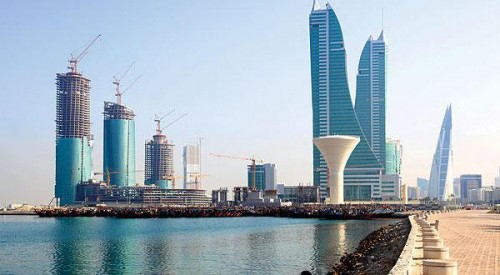Reuters: Fitch Downgrades Bahrain to 'BBB-' Outlook Stable

2015-06-06 - 8:39 p
Ruters: Fitch Ratings has downgraded Bahrain's Long-term foreign currency Issuer Default Rating(IDR) to 'BBB-' from 'BBB' and Long-term local currency IDR to 'BBB' from 'BBB+'. The Outlooks are Stable.
The issue ratings on Bahrain's senior unsecured foreign and local currency bonds have also been downgraded to 'BBB-' from 'BBB' and 'BBB' from 'BBB+', respectively.
The agency has simultaneously affirmed Bahrain's Country Ceiling at 'BBB+' and Short-term foreign currency IDR at 'F3'. KEY RATING DRIVERS The downgrade of the IDRs and senior debt ratings reflects the following key rating drivers and their relative weights: HIGH Lower oil prices have added to the strain on Bahrain's fiscal position.
Fiscal deficits have been recorded each year since 2008 and based on Fitch's oil price assumptions, the deficit is forecast to reach double digits, estimated at -10.9% of GDP in 2015 from -5.5% of GDP in 2014, before falling into high single digits in 2016 and 2017.
Fitch estimates Bahrain's fiscal breakeven oil price to be around USD 130/bl compared with an oil forecast for Brent to average USD65/bl in 2015, highlighting the fiscal challenges confronting the country.
The policy response has been modest, with the authorities taking a cautious approach due to social and competitiveness considerations. The emergence of sizeable fiscal deficits has led to a rapid rise in the general government debt burden, which reached 45.1% of GDP in 2014, materially above the 'BBB' median of 41.1%. Fich forecasts the governmet debt will continue climbing, reaching 54.2% of GDP in 2015 and 58.6% of GDP in 2016 on current policy settings.
Bahrain's 'BBB-' IDRs also reflect the following key rating drivers: Economic growth is above peers and has been unaffected by the fall in oil prices. Real non-oil growth was 4.9% in 2014, driven by tourism, social and personal services and construction. Execution of GCC-financed project work by local subcontractors will support non-oil growth of 4.0%-4.5% over the forecast period. The tourism industry, which is driven by the Saudi Arabian market, is also expected to continue registering high growth. Major expansions to manufacturing projects will contribute to growth. Inflation is forecast to stay below the peer median.
Bahrain's external balance sheet is stronger than its 'BBB' rated peers. The net external creditor position of 164% of GDP compares with a peer median of -5.4% of GDP.
After 12 consecutive years of current account surpluses, a small deficit is forecast for 2015. The current account is forecast to return to surplus in 2016. Although gross oil exports are over 50% of current external receipts (CXR), Bahrain also imports oil from Saudi Arabia to refine for export products, meaning net oil exports are 25% of CXR. Governance indicators are below the peer median.
There has been no progress in resolving the political stalemate since the opposition Wefaq party boycotted the elections of November 2014.
The boycott appears to have lost Wefaq support and the government does not seem inclined to deal with the party's current leadership. Sporadic low-level violence continues in some Shia villages, but the government has this under control and there is no disruption to business activity. Bahrain's financing flexibility has allowed it to be a regular Eurobond issuer, most recently raising USD1.25bn at a 30-year maturity in August.
The domestic capital market continues to provide the main source of financing.
The government has active conventional and Islamic issuance programmes and issued its first 10-year domestic sukuk in January 2015. GDP per capita and broader human development and business environment indicators exceed the 'BBB' median.
The strong regulatory framework and local skill base, combined with low costs, are key supports to the financial sector. Bahraini banks have enjoyed strong profitability, rising capitalisation, and declining NPLs. The smaller Islamic banks have continued to merge.
The sector is in the process of preparing for the implementation of Basel III regulations, and the Central Bank is overseeing measures aimed at improving corporate governance and oversight.
RATING SENSITIVITIES The main factors that individually, or collectively, could lead to negative rating action are: - A rise in government debt/GDP above our current forecasts, for example owing to an inadequate policy response or a sustained period of oil prices below out current forecasts. - Severe deterioration of the domestic security situation.
The main factors that, individually or collectively, could lead to positive rating action are: - Significant fiscal measures which reduce the budget deficit and are consistent with the stabilisation and then decline of the government debt-to-GDP ratio in the medium term. - A broadly accepted political solution that eases political unrest. - A recovery in oil prices that improves public finances. KEY ASSUMPTIONS Fitch forecasts that Brent crude will average USD65/b in 2015 and USD75/b in 2016. Fitch assumes that Bahrain will continue to benefit from savings through the implementation of GCC development projects financed by Kuwait, Saudi Arabia, and the UAE. Lower oil prices are not assumed to impact the flow of funds from these countries. Fitch assumes there will be no challenge to the rule of the royal family or the current succession. Fitch assumes no material deterioration in the internal security situation but also does not expect a comprehensive political solution to be achieved in the near term.
Bahrain is in a volatile region and its rating factors in existing tensions and conflicts which are assumed to continue. Fitch assumes that regional geopolitical conflicts will not directly impact Bahrain or its ability to trade.
- 2023-11-25S&P Revises Bahrain's Outlook to "Stable" on Fiscal Deficit Worries
- 2023-07-13Haj Sumoud Transferred from Dry Dock Prison to Al-Salmaniya Emergency Department after His Health Deteriorated
- 2023-06-22Bahraini Mumtalakat Buys Saudi McLaren's Stake
- 2023-05-18After Allocating $5 Billion Investment Fund, Is Bahrain Waiting New Saudi Support?
- 2022-09-21Abu Sa'afa Field Revenues Reach One Billion, 33 Million BD, Its Revenues Expected to Increase by 40% this Year